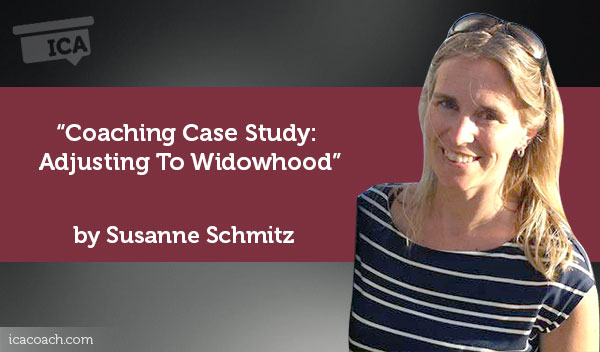Coaching Case Study By Susanne Schmitz
(Life Coach, UNITED STATES)
My case study involve a woman, Sarah who lost her husband and struggled to get structure in her life like a widow.
Sarah was married over 30 years and lost her husband this year. After the first months of mourning, she felt lost. It was difficult for her to stand up in the morning and to find a structure for the day and a reason to do anything. Her husband was ill over two years and she nursed him 24 hours the day without another help. In the past the illness structured her live, gave her a guideline, what she has to do. She was needed day and night without a break, she never asked why. She did it because she loved him and knew that he was thankful for all the time, energy and love she spent for him.
Now her love was gone after 30 years together and with him all her reason to stand up every morning and her daily job were gone.
In our sessions the most important part was to us the power listening skills.
The first sessions, I couldn’t ask much. She was talking a lot about the past, her feelings and her fears.
After the third session I started to us powerful questions very carefully because I didn’t wanted to heart her feelings. But it went very well. We figured out that it was important for her to find a structure in her life which gave her a guideline what was to do every day. We created a structure for the daily routine, first where she only had to take care of herself and her house. After some weeks we went a step forward to set new small goals like to meet friends, go to a doctor or to the hairdresser. After six sessions she told me that she feels much better and has the feeling that she found a new way for her life, she was more balanced, for sure the sadness about the lost from her husband wasn’t gone but it wasn’t anymore the biggest point in the day. She found a way to live with the sadness but without to lose herself.
A half year after our coaching training Sarah called me and told me that she is feeling fine and she was thankful for the coaching time that she took. She set a new goal for herself and booked a flight to her grandchild overseas for the next year.
This phone call was so positive and warmed my heart to hear that she found new energy and was able to set new goals for herself which were before to far away to think about it.
If I could start this coaching process again, I would be more prepared. To inform myself more what it means to be widow, to be more carefully with my questions and to make an appointment with the client after a certain time after the coaching process would be over. So that I could see, if our coaching session helped the client not only on a short-term but also on a long-term view. Or if the client would prefer to do again one or two coaching sessions.
This experience taught me, that careful listening and to be present in the moment is very import. The same like patience, to give the client room and space to think and to answer and not every coaching process will be the same.
